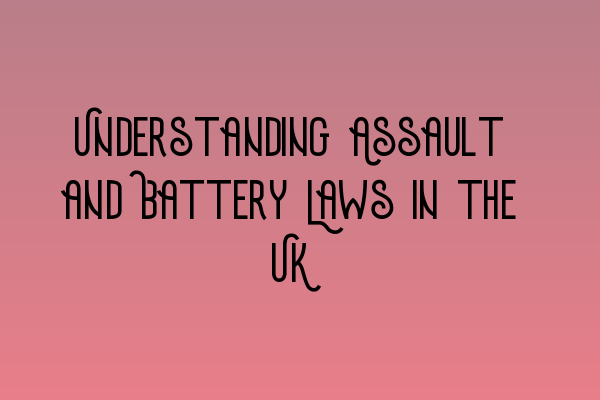Understanding Assault and Battery Laws in the UK
Assault and battery are two terms often used interchangeably, but they have distinct meanings under the law in the United Kingdom. These terms refer to different types of criminal offenses, with varying levels of severity and consequences. In this blog post, we will provide a comprehensive overview of assault and battery laws in the UK, explaining what they entail and how they are prosecuted.
Assault refers to the intentional act of causing another person to fear that unlawful force will be used against them. It is a crime that does not require physical contact. The key element of assault is the infliction of fear, leading someone to believe that they are in imminent danger of harm. The offense of assault can be committed by any means, such as through physical gestures, verbal threats, or other forms of intimidation.
Battery, on the other hand, involves the intentional and unlawful application of force upon another person. Unlike assault, battery requires physical contact with the victim. This physical contact can range from a slight touch to severe physical harm. Battery is considered a more serious offense than assault, as it involves the actual physical harm or unwanted physical contact.
It is important to note that assault and battery can both be committed with or without a weapon. The severity of the offense and the potential penalties will depend on the circumstances of the case, including the extent of harm caused and the presence of any aggravating factors.
In the UK, assault and battery offenses are prosecuted under the Offences Against the Person Act 1861 and the Criminal Justice Act 1988. The maximum penalties for assault and battery convictions vary depending on the specific offense and its severity. For common assault, which constitutes less serious harm, the maximum penalty is six months’ imprisonment and/or a fine. Aggravated assault, which involves more serious harm or the use of a weapon, can carry a sentence of up to life imprisonment.
When it comes to battery, the penalties are generally more severe. Simple battery, which involves physical force without causing serious harm, can result in a maximum sentence of six months’ imprisonment and/or a fine. However, if the battery causes grievous bodily harm (GBH) or wounding, the penalties are significantly higher, with the maximum sentence being life imprisonment.
It is essential to consult with a qualified criminal defense solicitor if you are facing assault or battery charges in the UK. They will review the details of your case, provide legal advice, and represent your interests throughout the legal process. With their expertise, they can assess the strength of the evidence against you, identify any potential defenses, and work towards achieving the best possible outcome.
If you are preparing for the Solicitors Qualifying Examination (SQE) in criminal law and practice, it is crucial to have a thorough understanding of assault and battery laws in the UK. Familiarizing yourself with these laws will ensure that you can apply the relevant legal principles confidently during the examination.
To enhance your SQE preparation, consider taking advantage of resources such as SQE 1 Practice Exam Questions and SQE 1 Practice Mocks FLK1 FLK2. These resources can help you test your knowledge and improve your abilities to answer questions related to assault and battery offenses.
Furthermore, enrolling in SQE 1 Preparation Courses and SQE 2 Preparation Courses can provide you with comprehensive knowledge and guidance for all aspects of criminal law and practice, including assault and battery laws. These courses are designed to equip aspiring solicitors with the necessary skills and knowledge to succeed in the SQE examinations and in their future legal careers.
Stay updated with important information, including SRA SQE Exam Dates, to ensure that you are aware of the latest developments in the SQE assessments. Being well-prepared and informed will give you a competitive edge, increasing your chances of success.
In conclusion, understanding assault and battery laws in the UK is vital for both legal professionals and individuals facing these charges. With assault involving the fear of imminent harm and battery referring to the actual physical contact, these offenses have distinct characteristics and potential consequences. If you are accused of assault or battery, seek legal advice immediately to protect your rights and ensure the best possible defense. And for aspiring solicitors, thorough preparation and access to relevant resources, such as practice exam questions and preparation courses, will be invaluable in achieving success in the SQE examinations.
